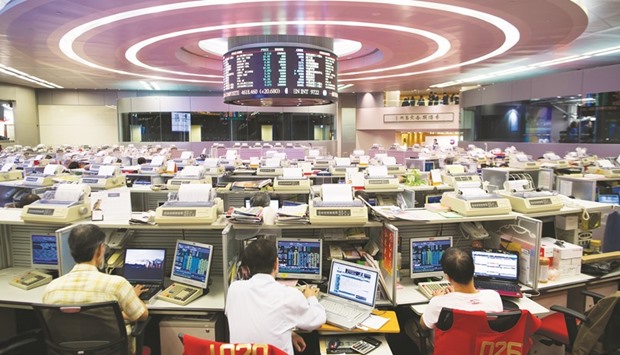Fading expectations of a US interest rate rise this year hit the dollar and boosted stocks in Asia yesterday, although Shanghai equities took a hammering from weak Chinese manufacturing data.
Friday’s report showing the world’s number one economy expanded just 1.2% year-on-year in April-June poured cold water on speculation the Federal Reserve will raise interest rates before year-end.
It also came hours after the Bank of Japan disappointed investors by deciding against ramping up its stimulus programme.
The two events stung the greenback, which ended Friday just above the ¥102 mark, well down from levels around ¥106 touched the day before.
In afternoon Asian trade, the dollar edged up slightly against the Japanese currency to ¥102.47.
But it lost ground against the South Korean won, Indonesian rupiah and Malaysian ringgit, which jumped 0.8%.
“The (US growth) was a massive miss, so I’m not surprised by the huge dollar selloff that ensued,” Thomas Averill, a managing director in Sydney at Rochford Capital, told Bloomberg News.
“The immediate risk at the moment is for a bit of further weakness in the US dollar on the moderated monetary tightening view.”
Forex traders are expecting Japanese Prime Minister Shinzo Abe to outline Tuesday details of the government’s ¥28tn stimulus announced last week.
The likelihood of US interest rates remaining low supported Asia’s equity markets, however.
Japan’s Nikkei ended up 0.4%, having recovered from early losses fuelled by the strong yen, while Taipei, Manila and Singapore posted healthy gains. Hong Kong closed up 1.1%, Sydney ended 0.5% higher and Seoul jumped 0.7%.
But Shanghai ended down 0.9% after China’s official purchasing managers’ index of manufacturing activity indicated the sector shrank last month.
It was the first time since February that the official figures have shown a contraction.
Economists surveyed by Bloomberg News had predicted it would flat-line.
The data is the latest bad news on the world’s number two economy, which is growing at its slowest rates in a quarter of a century.
“The economy is at the tipping point right now and there is a downward trend,” said Shen Jianguang, chief Asia economist at Mizuho Securities Asia Ltd in Hong Kong.
“The government seems to be concerned about bubbles now so policies are trending tighter.”
Unusually, the private Caixin purchasing managers’ index, which focuses on small companies, was more positive than the official figure — showing a surprise jump and marking the first expansion since February 2015.
In Tokyo, the Nikkei 225 up 0.4% at 16,635.77 points; Hong Kong — Hang Seng up 1.1% at 22,129.14 points and
Shanghai — Composite down 0.9% at 2,953.39 points at the close yesterday.

Traders work at the Hong Kong Stock Exchange. The Hang Seng closed up 1.1% to 22,129.14 points yesterday.
